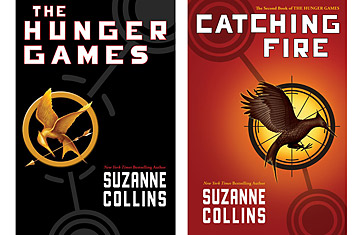
(2 of 2)
Whereas Katniss kills with finesse, Collins writes with raw power. After a life spent in freezing poverty, Katniss experiences pleasure--warmth, food, pretty clothes--with almost unbearable intensity, and that's where Collins' writing comes alive. (Not sex, though. The Hunger Games isn't just chaste, like Twilight; it's oddly non-erotic.) Likewise, Collins brings a cold, furious clarity to her accounts of physical violence. You might not think it would be possible, or desirable, for a young-adult writer to describe, slowly and in full focus, a teenage girl getting stung to death by a swarm of mutant hornets. It wasn't, until Collins did it. But rather than being repellent, the violence is strangely hypnotic. It's fairy-tale violence, Brothers Grimm violence--not a cheap thrill but a symbol of something deeper. (One of the paradoxes of the book is that it condemns the action in the arena while also inviting us to enjoy it, sting by sting. Despite ourselves, we do.)
Katniss survives the first novel, and the second finds her back in the arena, where she will try, in her words, to "show them that I'm more than just a piece in their Games." The Hunger Games and Catching Fire expose children to exactly the kind of violence we usually shield them from. But that just goes to show how much adults forget about what it's like to be a child. Kids are physical creatures, and they're not stupid. They know all about violence and power and raw emotions. What's really scary is when adults pretend that such things don't exist.
